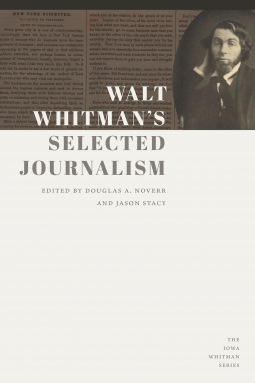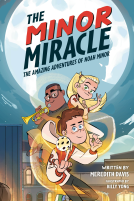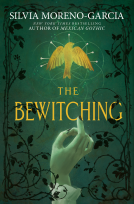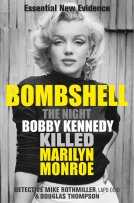
Walt Whitman's Selected Journalism
by Walt Whitman
This title was previously available on NetGalley and is now archived.
Send NetGalley books directly to your Kindle or Kindle app
1
To read on a Kindle or Kindle app, please add kindle@netgalley.com as an approved email address to receive files in your Amazon account. Click here for step-by-step instructions.
2
Also find your Kindle email address within your Amazon account, and enter it here.
Pub Date May 01 2015 | Archive Date Dec 01 2015
University of Iowa Press | The Iowa Whitman Series
Description
Walt Whitman’s Selected Journalism covers Whitman’s early years as a part-time editorialist and ambivalent schoolteacher between 1838 and 1841. After 1841, it follows his work as a dedicated full-time newspaperman and editor, most prominently at the New York Aurora and the Brooklyn Daily Eagle between 1842 and 1848. After 1848 and up to the Civil War, Whitman’s journalism shows his slow transformation from daily newspaper editor to poet. This volume gathers journalism from throughout these early years in his career, focusing on reporting, reviews, and editorials on politics and democratic culture, the arts, and the social debates of his day. It also includes some of Whitman’s best early reportage, in the form of the short, personal pieces he wrote that aimed to give his readers a sense of immediacy of experience as he guided them through various aspects of daily life in America’s largest metropolis.
Over time, journalism’s limitations pushed Whitman to seek another medium to capture and describe the world and the experience of America with words. In this light, today’s readers of Whitman are doubly indebted to his career in journalism. In presenting Whitman-the-journalist in his own words here, and with useful context and annotations by renowned scholars, Walt Whitman’s Selected Journalism illuminates for readers the future poet’s earliest attempts to speak on behalf of and to the entire American republic.
Advance Praise
“This generous selection of Whitman’s journalism could well be called ‘Whitman’s Foreground,’ echoing Ralph Waldo Emerson’s so very astute observation in 1855 thatLeaves of Grass ‘must have had a long foreground, for such a start.’ Well, that foreground was mainly this journalism in which the emerging poet of the 1840s and early 1850s absorbed the America he so loved—its throbbing cities, its colorful vernacular, its raging politics, and, later, the agony of its Civil War. It’s all here.”—Jerome Loving, author, Walt Whitman: The Song of Himself
“Noverr and Stacy’s unrivalled knowledge of Whitman’s journalism has allowed them not only to select judiciously from established printed scholarly sources, but also to avail themselves of the more recent work done by scholars to identify probable new instances of Whitman’s journalistic output. Whitman’s journalism needs and deserves to be better known, as it provides an index to his thinking, serves at times as a kind of ‘think tank’ and trial ground for his (largely subsequent) poetry, offers us a glimpse into his workaday world, and is also highly readable.”—M. Wynn Thomas, author, Transatlantic Connections: Whitman US-UK
Available Editions
| EDITION | Paperback |
| ISBN | 9781609383152 |
| PRICE | $29.95 (USD) |
Average rating from 7 members
Featured Reviews
 Joseph S, Reviewer
Joseph S, Reviewer
Walt Whitman is probably best known for the great work of American poetry, Leaves of Grass. However, his early published writing came from his work as a journalist for local New York newspapers. From these writings, Whitman's political views and his writing style are clearly illustrated. The University of Iowa Press has put together an impressive collection of Whitman's early writing.
Whitman's views tend to be complex rather than simple. One the issue of slavery, Whitman opposed the spread of slavery but spoke out against the abolitionists. He did, however, support the Wilmont Proviso, preventing the spread of slavery into new territories. In an interesting article, Whitman supports Oregon's constitutional provision preventing blacks from settling in the state. He reasons that since blacks will never be seen as equals and will never maintain the rights of white, perhaps it was better that they were not in Oregon to begin with. Whitman sided with the Free Soil Movement, a political party who believed that labor by free men was morally superior to slave labor.
Whitman also writes on a variety of issues from the 1840s through the 1860s. He takes sides in the Mexican American War with enthusiasm. He discusses the 1860 Presidential Election and the effects of the splintering of the Democratic Party. Whitman speaks well of Long Island and agrees with the ideas of others that Long Island could be its own state of its own. He also writes of local New York issues and politics. His writing covers a wide range of issues and topics.
In today's newscasts, where currently two major news hosts are under fire for the inaccuracy of their reporting, sensationalism is the lead story. Twenty years ago Dateline NBC rigged a GM vehicle to explode to prove a claim of a faulty gas tank. Before then the standard theme was "If it bleeds, it leads." The News is a business and does what it needs to to gain readers/viewers. In a far distant past, when there were as many newspapers in a city as churches, there was a many reporters, and many ways to make your mark and become successful. Whitman's writing is what sets him apart. His use of words and style supersede the substance of the article. The reader feels compelled to read the article even if he or she does not agree with the subject.
Each news article is cited with detailed information. The source of the article and most importantly historical notes related to the article. People mentioned and even historically obscure events are detailed to allow the reader to put the article into historical context.
Walt Whitman's Selected Journalism is an interesting look at the early prose writing of a great poet and a look at the reported news in the United States. The history is what the average person would have read in the newspaper, however, the writer is far from average. This is an impressive collection of historical viewpoints by a great American writer.
 Anne M, Reviewer
Anne M, Reviewer
Review Of Walt Whitman’s Selected Journalism
This book is a collection of the journalism of one of the Western world’s greatest poets going back to before he published his poetry. It takes us through the American War of Independence whilst telling us his views on slavery, local politics and the British monarchy along the way. The book is chronological with a thorough introduction for those unfamiliar with the man but which also holds much useful information for anyone who understands Whitman. The editors, Douglas A Noverr and Jason Stacy, have done an excellent job of gathering and contextualising the sometimes meandering writings of the great man.
Two letters side by side from 1847 illustrate this when we have one complaining of the “negligence of certain municipal officers” in not keeping the streets clean and the next an editorial about a speech on Liberty where Whitman praises Mr Giles (the speaker) saying his words will live long in the memory.
The eclectic mix is fascinating and the book can be opened at any page and a delight will be found. It is strangely addictive. Seeing the inconsequential items beside the huge gives it a depth rather than trivialising things and the overall read is very enlightening about this period in 19th century America.
Recommended for historians of the period as well as lovers of Whitman’s poetry, the book will reward the reader.
I was given a copy of this book via Netgalley in return for an honest review.
 Susan M, Reviewer
Susan M, Reviewer
This book gives one the opportunity to see Whitman's writings as a newspaper reporter and his early prose. His views were complicated. He wrote a variety of subjects. He edited three newspapers. Whitman wrote and published reviews, editorials and human-interest stories.
Readers who liked this book also liked:
We Are Bookish
General Fiction (Adult), Romance, Women's Fiction


















